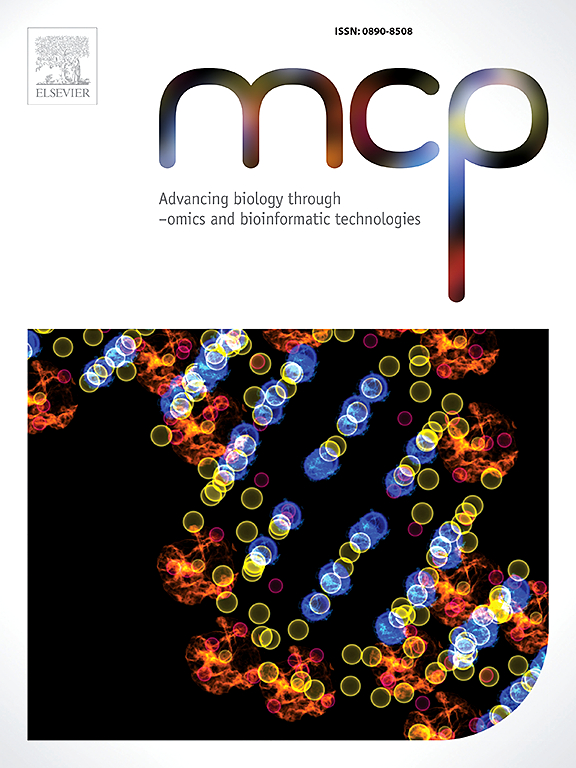泛素特异性肽酶53抑制乳腺癌细胞发生及其相关基因分析。
IF 3
3区 生物学
Q3 BIOCHEMICAL RESEARCH METHODS
引用次数: 0
摘要
背景:乳腺癌(BC)仍然是影响全球妇女健康的最常见恶性肿瘤。因此,阐明驱动BC进展的分子机制和确定新的治疗靶点是必要的。泛素特异性肽酶53 (USP53)是一种去泛素化酶,据报道在几种类型的癌症中发挥肿瘤抑制作用。然而,USP53在BC中的研究很少。方法:基于TCGA数据库和GTEx转录组数据,筛选BC中差异表达基因,分析USP53表达与BC特征及预后的关系。qRT-PCR、western blot和免疫组化检测USP53的表达。转染后,采用CCK-8和Transwell实验评估BC细胞的增殖、迁移和侵袭。采用裸鼠皮下移植瘤模型评价USP53在体内的作用。此外,使用Cibersort软件包筛选USP53表达相关的免疫细胞。结果:USP53在BC患者中表达降低,具有潜在的诊断意义。功能上,过表达USP53抑制了BC细胞的增殖、迁移和侵袭,而沉默USP53则促进了这些恶性行为。在体内,usp53过表达细胞衍生的肿瘤生长更慢,Ki67表达更低。此外,我们发现Tcm、T辅助细胞、肥大细胞和嗜酸性粒细胞与USP53表达呈正相关,而NK CD56dim细胞和TReg与USP53表达负相关。结论:我们共同证明了USP53在BC中下调,并在体外和体内减弱了BC细胞的恶性进展。USP53还与多种免疫细胞有关。我们的研究提示USP53可能是BC治疗的新靶点。本文章由计算机程序翻译,如有差异,请以英文原文为准。
Ubiquitin-specific peptidase 53 suppresses the tumorigenesis of breast cancer cells and its related gene analysis
Background
Breast cancer (BC) remains the most common malignancy affecting women's health globally. Thus, elucidating the molecular mechanisms driving BC progression and identifying novel therapeutic targets is imperative. Ubiquitin-specific peptidase 53 (USP53) is a deubiquitinating enzyme reported to exert tumor-suppressive effects in several types of cancers. However, USP53 has been poorly studied in BC.
Methods
Based on the TCGA database and GTEx transcriptome data, differentially expressed genes in BC were screened, and the relationship between USP53 expression and BC characteristics and prognosis were analyzed. qRT-PCR, Western blot, and immunohistochemistry determined USP53 expression. After transfection, BC cells’ proliferation, migration, and invasion were assessed using CCK-8 and Transwell assay. A subcutaneous xenograft tumor model in nude mice was used to evaluate the in vivo effect of USP53. Besides, USP53 expression-associated immune cells were screened using the Cibersort package.
Results
USP53 expression was reduced in BC patients and showed potential diagnostic significance. Functionally, overexpressing USP53 inhibited BC cell proliferation, migration, and invasion, while silencing it promoted these malignant behaviors. In vivo, tumors derived from USP53-overexpressing cells grew more slowly and exhibited lower Ki67 expression. Additionally, we found that Tcm, T helper cells, Mast cells, and Eosinophils were positively associated with USP53 expression, whereas NK CD56dim cells and TReg were negatively associated with USP53 expression.
Conclusions
Together, we proved that USP53 was down-regulated in BC and weakened the malignant progression of BC cells both in vitro and in vivo. USP53 was also associated with a variety of immune cells. Our study suggested that USP53 may be a novel target for BC therapy.
求助全文
通过发布文献求助,成功后即可免费获取论文全文。
去求助
来源期刊

Molecular and Cellular Probes
生物-生化研究方法
CiteScore
6.80
自引率
0.00%
发文量
52
审稿时长
16 days
期刊介绍:
MCP - Advancing biology through–omics and bioinformatic technologies wants to capture outcomes from the current revolution in molecular technologies and sciences. The journal has broadened its scope and embraces any high quality research papers, reviews and opinions in areas including, but not limited to, molecular biology, cell biology, biochemistry, immunology, physiology, epidemiology, ecology, virology, microbiology, parasitology, genetics, evolutionary biology, genomics (including metagenomics), bioinformatics, proteomics, metabolomics, glycomics, and lipidomics. Submissions with a technology-driven focus on understanding normal biological or disease processes as well as conceptual advances and paradigm shifts are particularly encouraged. The Editors welcome fundamental or applied research areas; pre-submission enquiries about advanced draft manuscripts are welcomed. Top quality research and manuscripts will be fast-tracked.
 求助内容:
求助内容: 应助结果提醒方式:
应助结果提醒方式:


